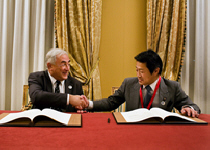
Typical street scene in Santa Ana, El Salvador. (Photo: iStock)
IMF Survey: IMF Signs $100 Billion Borrowing Agreement With Japan
February 13, 2009
- Injection of funds by Japan will strengthen IMF's ability to tackle global crisis
- IMF seeking to double funding to $500 billion
- Executive Board considering other ways to increase resources
Japan has provided the IMF with an additional $100 billion to bolster the Fund's lendable resources during the current global economic and financial crisis.

Strauss-Kahn (left) shakes hands after the signing ceremony with Shoichi Nakagawa, Japan's Minister of Finance (photo: IMF)
IMF Lending
Managing Director Dominique Strauss-Kahn and Shoichi Nakagawa, Minister of Finance of Japan, signed the terms of Japan's $100 billion commitment on February 13 under a borrowing agreement designed to temporarily supplement the Fund's financial resources.
The IMF said the additional funds will bolster its capacity to provide timely and effective balance of payments assistance to its 185 member governments.
Crisis-lending
The IMF has so far committed around $48 billion in lending to a number of economies affected by the crisis, including Belarus, Hungary, Iceland, Latvia, Pakistan, Serbia, and Ukraine. It announced a precautionary loan for El Salvador last month and an IMF team has also been in negotiations with Turkey.
The IMF expects global growth to grind to a virtual halt in 2009, with the advanced economies in a recession. The economic crisis has caused global trade and capital flows to plummet.
The formal signing of the agreement in Rome, Italy, follows the IMF Executive Board's approval of the terms on February 12, 2009. Taro Aso, Japanese Prime Minister, announced in November 2008 that Japan would be willing to provide supplemental funding to the IMF, to help overcome the current global crisis (see Press Release No. 08/284).
Apart from the new money from Japan, the IMF has around $200 billion in lendable resources.
Managing Director Dominique Strauss-Kahn wants to boost the IMF's lendable resources to around $500 billion, both as a precaution in case the crisis gets worse and as reassurance that the IMF can meet any eventuality. The IMF's Executive Board is considering a number of ways to strengthen the Fund's resources, including additional borrowing from official sources.
Single-largest commitment
Strauss-Kahn, on a trip to Rome to attend a meeting of ministers from the Group of Seven (G-7) advanced economies, said the IMF was deeply grateful for the Japanese government's support [see video reaction].
"This commitment is the single-largest supplemental financing contribution by an IMF member country ever, and it clearly demonstrates Japan's continuing commitment to a multilateral approach to global economic and financial challenges. We are hopeful that other countries will join Japan in providing their support to the Fund's efforts."
Japan's total commitment is equivalent to about 31 percent of total Fund quotas, the capital members put into the IMF when joining.
The initial period of the commitment by Japan is for one year, and may be extended by the IMF for up to a total of five years if warranted by the Fund's liquidity situation and its actual and prospective borrowing needs. Each drawing will carry interest at the interest rate on the IMF's Special Drawing Rights, which is currently 0.62 percent.
Comments on this article should be sent to imfsurvey@imf.org


